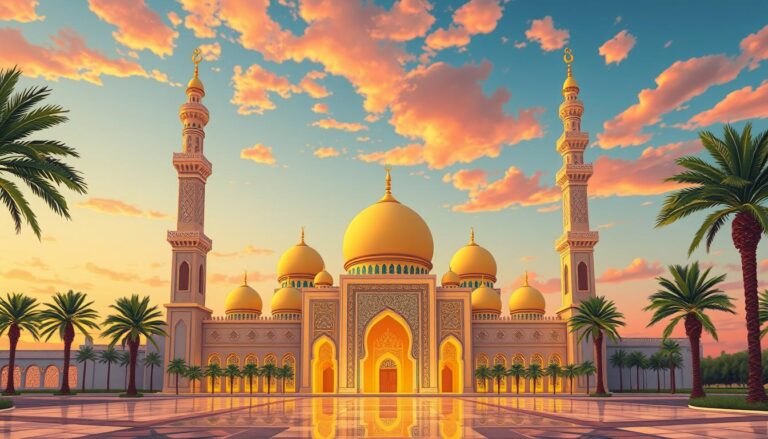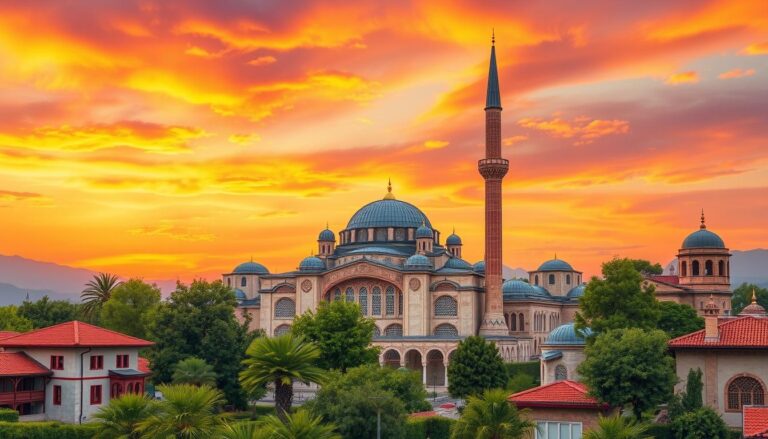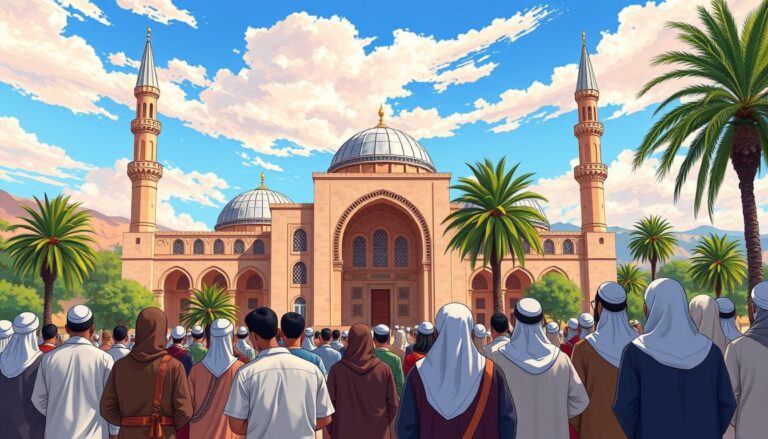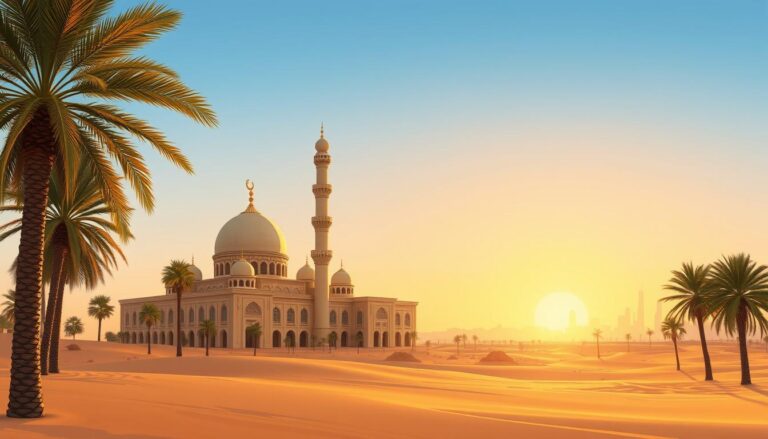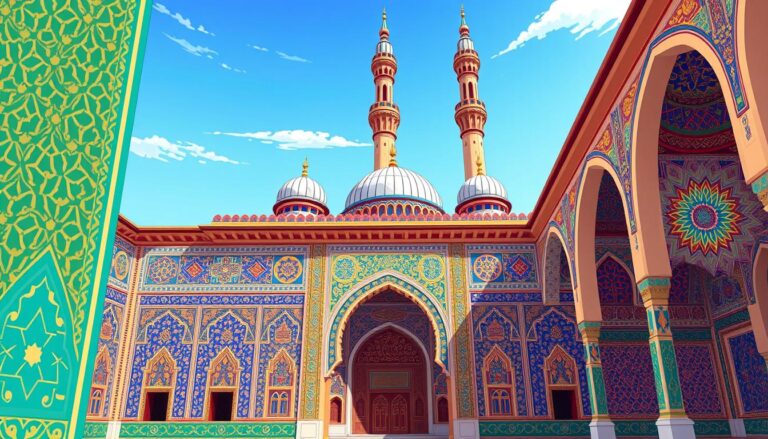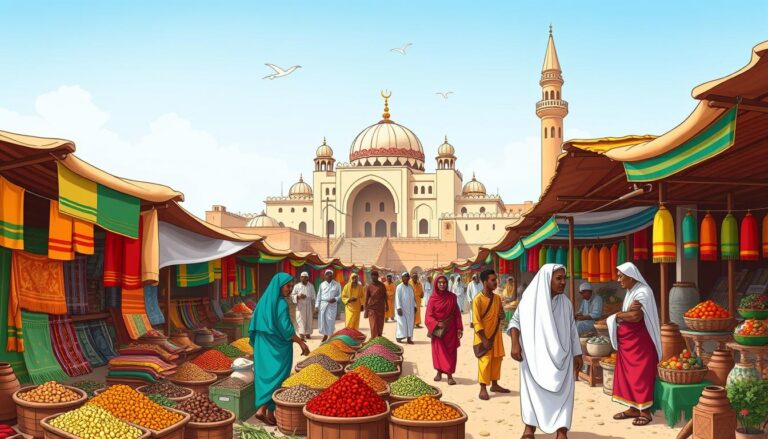Islam in Eritrea
Islam is a big part of Eritrea’s religious mix, with a Muslim population of 37-52% of the total. The first Muslims came to the Horn of Africa, including Eritrea, in the 7th century AD. They were fleeing persecution in Mecca.
Over time, Islam spread across Eritrea’s lowlands. Most Muslims live in the northern and eastern parts of the country. Today, Sunni Islam is the main Islamic sect in Eritrea.
Historical Roots of Islam in the Horn of Africa
The story of Islam in Eritrea and the Horn of Africa began in the 7th century AD. The first Muslim migrants came to the area to escape persecution in Mecca. They were welcomed by the Aksumite king in what is now Eritrea and Ethiopia.
Arrival of the First Muslim Migrants
The first Muslims to reach the Horn of Africa were 16 people. They were followed by 101 more. The Negus, Ashama ibn Abjar, was a fair ruler who let them live and pray freely.
The Expansion of Islamic Influence
As time went on, Islam spread across the lowlands of the Horn of Africa. The Muslim population grew, especially in northern and eastern Eritrea. By the 9th century, Muslim Sultanates were set up, making Islam a strong presence.
“Islam arrived in al-Habashah before Madinah, making East Africa the first place outside of the Arabian Peninsula where Islam spread freely.”
The spread of Islam was helped by the region’s key location and its ties to the Indian Ocean trade. This made it easy to share Islamic teachings and build new Muslim communities.
Today, the Horn of Africa is deeply rooted in Islam. A big part of the population follows the faith. The area’s rich Islamic history and ongoing influence make it a captivating topic for scholars and researchers.
Demographics of Muslims in Eritrea
The Muslim population in Eritrea is a big part of the country’s diverse religious scene. It’s estimated that Muslims make up 37-52% of Eritrea’s people. Most Muslims live in the northern and eastern parts of the country.
Regional Distribution and Ethnic Diversity
The Muslims in Eritrea come from many ethnic groups. The Tigre, Saho, Afar, Bilen, Hedareb, Nara, and Rashaida are mostly Sunni Muslim. On the other hand, the Tigrinya, the biggest ethnic group, is mostly Christian. This shows how complex and mixed Eritrea’s culture and religion are.
- The northern and eastern regions of Eritrea have a significant Muslim majority population.
- The Tigre, Saho, Afar, Bilen, Hedareb, Nara, and Rashaida ethnic groups are predominantly Sunni Muslim.
- The Tigrinya, the largest ethnic group in Eritrea, is predominantly Christian.
“The religious landscape in Eritrea is complex, and while the law allows for religious freedom on paper, there is evidence that unregistered religious groups face discrimination and mistreatment, with reported arrests and detentions of individuals based on their faith.”
Despite the diversity, Muslims in Eritrea face challenges. The government and society sometimes restrict them. This is because Eritrea struggles to balance religious freedom with the real religious tensions it faces.
Sunni Islam: The Predominant Sect in Eritrea
Sunni Islam is the main religion in Eritrea, with most people following it. This is different from its neighbors, where Shia Islam is more common. For centuries, Sunni Islam has been a big part of Eritrea, starting with the first Muslims in the 7th century AD.
This tradition has strong roots in Eritrea and is a big part of the country’s culture. Sunni Muslims follow the main teachings of Islam and take part in many religious events. Despite their differences, Sunni Muslims in Eritrea come together because of their faith.
- Sunni Islam is the predominant Islamic sect in Eritrea, practiced by the majority of the country’s Muslim population.
- The Sunni Islamic tradition has been firmly established in Eritrea for centuries, with the first Muslim migrants arriving in the 7th century AD.
- Sunni Muslims in Eritrea adhere to the core tenets of Islam, including the five pillars of the faith, and actively participate in various religious practices and celebrations.
- The Sunni community in Eritrea is diverse, encompassing various ethnic and linguistic groups, all united by their shared faith.
The big presence of Sunni Islam in Eritrea shows its strong influence in the area. As the main Islamic sect, Sunni Islam shapes Eritrea’s culture, religion, and society. It adds to the country’s rich and varied religious heritage.
Islam in Eritrea
Muslim Practices and Traditions
Eritrean Muslims follow the Sunni Islamic tradition. They believe in five key pillars: shahada, salat, zakat, sawm, and hajj. They also celebrate Islamic festivals like Eid al-Fitr and Eid al-Adha.
These practices show the strong Islamic presence in Eritrean society.
The Role of Islam in Eritrean Society
Islam shapes Eritrea’s cultural norms and traditions. It influences social structures, daily life, and the role of Islam in Eritrean society. Sunni Islam, being the main sect, has a big impact on the country.
“Islam is deeply woven into the fabric of Eritrean life, influencing everything from family values to community celebrations.”
The Great Mosque of Asmara is a symbol of Eritrea’s Sunni Islamic heritage. It shows the importance of Islam in the country. Even with government control, Muslims in Eritrea keep their faith and traditions alive. They play a key role in the nation’s culture and society.
Mosques and Islamic Architecture in Eritrea
Eritrea, in the Horn of Africa, has a rich Islamic architecture. It shows the long history of Islam in the area. Mosques here range from old to new, with many styles over the years.
The Mosque of the Companions in Massawa, Eritrea, is very famous. It might be the oldest mosque in Africa, built in the 7th century. It was made by Prophet Muhammad’s family, showing early Islam in the region.
This mosque has an open area for prayer and a stone building with a mihrab and minbar. It looks similar to the Mosque of Sheikh Hammali, showing shared design over time.
In Asmara, the Great Mosque of Asmara is a key Islamic site. Built in 1936, it’s a center for Muslims in the city. About 50% of Asmara’s people are Muslim.
The mosques in Eritrea mix Islamic styles with local building methods. These buildings are not just for prayer. They also hold cultural and historical value, showing the beauty of Islamic architecture in Eritrea.
Coexistence Between Islam and Other Religions
Eritrea is known for its religious coexistence and harmony among different faiths. Islam and Christianity, the two main religions, live in peace here. This tradition of religious tolerance is deeply rooted in the country’s diverse culture and history.
The way people live in Eritrea is interesting. Most people in the lowlands are Muslim, while the highlands are mostly Christian. Yet, people of different faiths often live together, sharing celebrations and events.
The government in Eritrea is secular, making sure no religion is favored over another. Schools teach all religions, helping students understand and respect each other. National service programs and development projects also bring young people from different religions together, helping to break down prejudices.
Inter-religious dialogue and teamwork are common in Eritrea. Religious leaders and groups work together to solve problems, like helping deportees and resolving tribal conflicts. This shows the strong bonds between the country’s religious communities.
Even though there have been some tensions and government restrictions, the harmony and coexistence between Islam and other faiths in Eritrea is still high. The country’s diverse religious scene shows the resilience and adaptability of its people. They have long valued their shared cultural heritage.
“The peaceful coexistence of different religions in Eritrea is a source of pride and inspiration for the entire nation.”
Challenges Faced by the Muslim Community
The Muslim community in Eritrea faces many challenges. Government policies and restrictions make it hard for them to practice their faith freely. The Eritrean government only recognizes four religions, including Sunni Islam. All other groups must go through a long registration process to be legal.
This has led to the arrest of many from unregistered groups, including Muslims. The government’s rule of indefinite national service also worries Muslims. It can stop them from following their religious duties and keeping their traditions.
Restrictions on Religious Freedom
Eritrea is known for its harsh treatment of religious freedom, alongside North Korea. The ruling party, the People’s Front for Democracy and Justice (PFDJ), makes things worse for Muslims. In 2002, the state closed all religions except the four it officially recognizes.
- Eritrea introduced a policy in 2002 ordering the closure of all religions except the four officially recognized beliefs.
- Members of religious groups not formally recognized by the state face persecution and risk severe consequences if caught practicing their faith.
- The political leadership in Eritrea is described as authoritarian, unaccountable, volatile, and violent, further exacerbating the challenges faced by the Muslim community.
Despite these obstacles, Muslims in Eritrea keep their faith alive. They work hard to keep their religious and cultural traditions alive. The fight for the right to practice their faith freely is a big issue for them.
“Eritrea has been described as one of the worst abusers in the world in terms of religious persecution, along with North Korea.”
Cultural Celebrations and Festivals
Eritrean Muslims enjoy many cultural and religious festivals all year. These events help keep their cultural and religious identity strong. They also bring people together in Eritrean society.
The big Islamic holidays, Eid al-Fitr and Eid al-Adha, are celebrated nationwide. During these times, Muslims come together for prayer, food, and community. It’s a chance to share their faith and traditions.
Other key Islamic festivals in Eritrea include Mawlid and Laylat al-Qadr. These events bring the Eritrean Muslim community closer. They help everyone feel united and spiritually connected.
But Eritrea also celebrates national holidays like Independence Day and Martyr’s Day. These days show off the country’s rich culture and the people’s strength.
“These events serve to strengthen the cultural and religious identity of the Muslim community while promoting social cohesion within Eritrean society.”
The Eritrea Festival in Asmara is a big deal, drawing almost 600,000 people. It’s a lively event that highlights Eritrea’s traditions in literature, music, art, and folklore.
Eritrea’s culture is also seen in its food, buildings, and movies. Traditional dishes like stews on injera bread show off the country’s food heritage. The architecture in cities like Asmara and Massawa adds to Eritrea’s unique look.
Conclusion
Islam has a long history in Eritrea, starting in the 7th century AD. The first Muslim migrants arrived then. Over time, Islamic influence grew strong, with Sunni Islam being the main sect. About 37-52% of the people practice it.
The Muslim community in Eritrea has faced many challenges. These include government restrictions. Yet, the country still values religious tolerance and coexistence.
Islamic cultural events and festivals show Islam’s big role in Eritrean society. As Eritrea changes, the future of Islam in Eritrea will be shaped by many factors. The role of Islam in Eritrea will likely stay important, but the future of Islam in Eritrea is uncertain.
The Muslim community in Eritrea has shown great resilience and adaptability. They have kept their religious and cultural identity alive. Preserving the diverse religious heritage, including the role of Islam in Eritrea, is key to a more inclusive society.
Source Links
- Religion in Eritrea
- Eritrea – Christianity, Islam, Animism
- Eritrea – United States Department of State
- Islam in Africa
- The Origins of Islam in East Africa
- IslHornAfr: Islam in the Horn of Africa: A Comparative Literary Approach
- Eritrea – United States Department of State
- Demographics of Eritrea
- National Profiles | World Religion
- State, Religion and Ethno-Regional Politics – Awate.com
- Islam in Ethiopia and Eritrea
- Religious Freedom Conditions in Eritrea
- Religious Faith And Persecution In Eritrea
- Mosque of the Companions
- Great Mosque of Asmara
- as-Sahaba Mosque – Madain Project (en)
- Christian-Moslem Relationships in Eritrea
- Eritrea
- Tigray in History: A Pioneer of Religious Coexistence
- Chapter Mekonnen_2014.fm
- Eritrea – Minority Rights Group
- Eritrea Holidays and Festivals
- Eritrean Culture
- Culture of Eritrea – history, people, clothing, women, beliefs, food, customs, family, social
- World Report 2023: Rights Trends in Eritrea
- Milestones in the history of Islam in Eritrea
- The troubled relationship of state and religion in Eritrea


